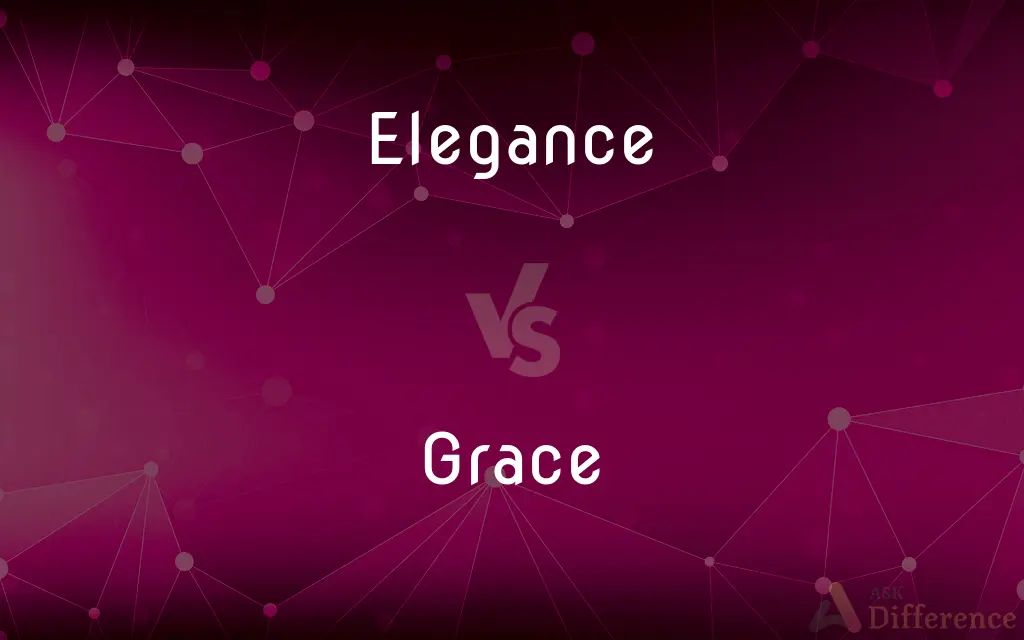Elegance vs. Grace — What's the Difference?
Edited by Tayyaba Rehman — By Maham Liaqat — Updated on March 12, 2024
Elegance often refers to beauty and sophistication in appearance or manner, while grace emphasizes smoothness, and natural ease in movement or behavior.

Difference Between Elegance and Grace
Table of Contents
ADVERTISEMENT
Key Differences
Elegance is characterized by beauty, sophistication, and an absence of unnecessary elements, often associated with fashion, design, or behavior. It conveys a sense of refinement and deliberate composition, where every detail is purposeful and contributes to the overall aesthetic. Whereas grace is more about the natural, effortless way someone carries themselves or performs an action. It's linked to fluidity, poise, and a kind of inherent dignity that seems unlearned and intuitive.
While elegance can be achieved through careful thought, design, and cultivation, grace often appears more innate, suggesting an inner quality that surfaces naturally. Elegance might be seen in the meticulous design of a gown or the careful layout of a room, highlighting human ingenuity and taste. On the other hand, grace is evident in the way a dancer moves or a person navigates a complex situation with apparent ease, suggesting a harmony between the individual and their actions.
Elegance can be somewhat subjective, as what is considered elegant in one culture or context might not be seen the same way in another. It's often tied to social and cultural norms about what is considered "beautiful" or "sophisticated." Grace, however, is more universally recognized, as it transcends cultural and social boundaries, being more about the essence of movement or behavior than its form.
In the realm of physical objects, elegance might refer to the simplicity and clarity of design that makes something both beautiful and functional. Whereas grace in objects is less common, it could be used to describe the way an object moves or functions with ease, such as a gracefully designed piece of machinery.
Elegance requires an observer to be appreciated, relying on external validation for its recognition. Grace, while it can be observed and admired, does not require an audience to exist. It is as much about the internal state of being as it is about external perception, embodying a spirit of ease and harmony within oneself or one’s actions.
ADVERTISEMENT
Comparison Chart
Definition
Beauty and sophistication in appearance or manner.
Smoothness and natural ease in movement or behavior.
Association
Fashion, design, behavior.
Movement, behavior.
Origin
Often cultivated or designed.
Considered more innate or natural.
Perception
Subjective, culturally influenced.
More universally recognized, transcends cultural boundaries.
In Objects
Simplicity and functionality in design.
The ease of movement or functionality.
Compare with Definitions
Elegance
Simplicity and effectiveness in design or execution.
The elegance of the solution lay in its simplicity.
Grace
The courteous goodwill.
He accepted the criticism with grace.
Elegance
The attribute of being tastefully designed or arranged.
Her home's decor showcased elegance in every detail.
Grace
Be beautiful to look at;
Flowers adorned the tables everywhere
Elegance
Refinement and sophistication in behavior or presentation.
His elegance at the dinner table impressed all the guests.
Grace
The condition or fact of being favored or held in esteem.
She thanked her host for the grace of their hospitality.
Elegance
The state of being pleasingly ingenious and simple.
The mathematical proof was admired for its elegance.
Grace
A temporary exemption or reprieve.
The library granted him a grace period before charging late fees.
Elegance
The quality of being graceful and stylish in appearance or manner.
The elegance of the ballroom was breathtaking.
Grace
The quality of moving in a smooth, relaxed, and attractive way.
The ballerina danced with unsurpassed grace.
Elegance
Elegance is beauty that shows unusual effectiveness and simplicity. Elegance is frequently used as a standard of tastefulness, particularly in visual design, decorative arts, literature, science, and the aesthetics of mathematics.
Grace
Seemingly effortless beauty or charm of movement, form, or proportion.
Elegance
The quality of being graceful and stylish in appearance or manner
A slender woman with grace and elegance
Grace
A characteristic or quality pleasing for its charm or refinement.
Elegance
The quality of being pleasingly ingenious and simple; neatness
The simplicity and elegance of the solution
Grace
A sense of fitness or propriety.
Elegance
Refinement, grace, and beauty in movement, appearance, or manners.
Grace
A disposition to be generous or helpful; goodwill.
Elegance
Tasteful opulence in form, decoration, or presentation.
Grace
Mercy; clemency.
Elegance
Restraint and grace of style.
Grace
A favor rendered by one who need not do so; indulgence.
Elegance
Scientific exactness and precision.
Grace
A temporary immunity or exemption; a reprieve.
Elegance
Something elegant.
Grace
Graces Greek & Roman Mythology Three sister goddesses, known in Greek mythology as Aglaia, Euphrosyne, and Thalia, who dispense charm and beauty.
Elegance
Grace, refinement, and beauty in movement, appearance, or manners.
The bride was elegance personified.
Grace
Divine favor bestowed freely on people, as in granting redemption from sin.
Elegance
Restraint and grace of style.
The simple dress had a quiet elegance.
Grace
The state of having received such favor.
Elegance
The beauty of an idea characterized by minimalism and intuitiveness while preserving exactness and precision.
The proof of the theorem had a pleasing elegance.
Grace
An excellence or power granted by God.
Elegance
A refinement or luxury.
Grace
A short prayer of blessing or thanksgiving said before or after a meal.
Elegance
The state or quality of being elegant; beauty as resulting from choice qualities and the complete absence of what deforms or impresses unpleasantly; grace given by art or practice; fine polish; refinement; - said of manners, language, style, form, architecture, etc.
That grace that elegance affords.
The endearing elegance of female friendship.
A trait of native elegance, seldom seen in the masculine character after childhood or early youth, was shown in the General's fondness for the sight and fragrance of flowers.
Grace
Grace Used with His, Her, or Your as a title and form of address for a duke, duchess, or archbishop.
Elegance
That which is elegant; that which is tasteful and highly attractive.
The beautiful wildness of nature, without the nicer elegancies of art.
Grace
(Music) An appoggiatura, trill, or other musical ornament in the music of 16th and 17th century England.
Elegance
A refined quality of gracefulness and good taste
Grace
To honor or favor
You grace our table with your presence.
Grace
To give beauty, elegance, or charm to.
Grace
(Music) To embellish with grace notes.
Grace
Charming, pleasing qualities.
The Princess brought grace to an otherwise dull and boring party.
Grace
(countable) A short prayer of thanks before or after a meal.
It has become less common to say grace before having dinner.
Grace
In the games of patience or solitaire: a special move that is normally against the rules.
Grace
A grace note.
Grace
(uncountable) Elegant movement; balance or poise.
The dancer moved with grace and strength.
Grace
An allowance of time granted to a debtor during which he or she is free of at least part of his normal obligations towards the creditor.
The repayment of the loan starts after a three-year grace.
Grace
Free and undeserved favour, especially of God; unmerited divine assistance given to humans for their regeneration or sanctification, or for resisting sin.
Grace
An act or decree of the governing body of an English university.
Grace
(transitive) To adorn; to decorate; to embellish and dignify.
He graced the room with his presence.
He graced the room by simply being there.
His portrait graced a landing on the stairway.
Grace
(transitive) To dignify or raise by an act of favour; to honour.
Grace
(transitive) To supply with heavenly grace.
Grace
To add grace notes, cadenzas, etc., to.
Grace
The exercise of love, kindness, mercy, favor; disposition to benefit or serve another; favor bestowed or privilege conferred.
To bow and sue for graceWith suppliant knee.
Grace
The divine favor toward man; the mercy of God, as distinguished from His justice; also, any benefits His mercy imparts; divine love or pardon; a state of acceptance with God; enjoyment of the divine favor.
And if by grace, then is it no more of works.
My grace is sufficicnt for thee.
Where sin abounded, grace did much more abound.
By whom also we have access by faith into this grace wherein we stand.
Grace
The prerogative of mercy execised by the executive, as pardon.
Grace
Fortune; luck; - used commonly with hard or sorry when it means misfortune.
Grace
Inherent excellence; any endowment or characteristic fitted to win favor or confer pleasure or benefit.
He is complete in feature and in mind.With all good grace to grace a gentleman.
I have formerly given the general character of Mr. Addison's style and manner as natural and unaffected, easy and polite, and full of those graces which a flowery imagination diffuses over writing.
Grace
Beauty, physical, intellectual, or moral; loveliness; commonly, easy elegance of manners; perfection of form.
Grace in women gains the affections sooner, and secures them longer, than any thing else.
I shall answer and thank you again For the gift and the grace of the gift.
Grace
Graceful and beautiful females, sister goddesses, represented by ancient writers as the attendants sometimes of Apollo but oftener of Venus. They were commonly mentioned as three in number; namely, Aglaia, Euphrosyne, and Thalia, and were regarded as the inspirers of the qualities which give attractiveness to wisdom, love, and social intercourse.
The Graces love to weave the rose.
The Loves delighted, and the Graces played.
Grace
The title of a duke, a duchess, or an archbishop, and formerly of the king of England.
How fares your Grace !
Grace
Thanks.
Yielding graces and thankings to their lord Melibeus.
Grace
A petition for grace; a blessing asked, or thanks rendered, before or after a meal.
Grace
Ornamental notes or short passages, either introduced by the performer, or indicated by the composer, in which case the notation signs are called grace notes, appeggiaturas, turns, etc.
Grace
An act, vote, or decree of the government of the institution; a degree or privilege conferred by such vote or decree.
Grace
A play designed to promote or display grace of motion. It consists in throwing a small hoop from one player to another, by means of two sticks in the hands of each. Called also grace hoop or hoops.
That day of grace fleets fast away.
The grace cup follows to his sovereign's health.
To [Queen Margaret, of Scotland] . . . we owe the custom of the grace drink, she having established it as a rule at her table, that whosoever staid till grace was said was rewarded with a bumper.
Content to do the profession some grace.
What might have been done with a good grace would at leastbe done with a bad grace.
Grace
To adorn; to decorate; to embellish and dignify.
Great Jove and Phoebus graced his noble line.
We are graced with wreaths of victory.
Grace
To dignify or raise by an act of favor; to honor.
He might, at his pleasure, grace or disgrace whom he wouldin court.
Grace
To supply with heavenly grace.
Grace
To add grace notes, cadenzas, etc., to.
Grace
(Bhristian theology) a state of sanctification by God; the state of one who under such divine influence;
The conception of grace developed alongside the conception of sin
It was debated whether saving grace could be obtained outside the membership of the church
The Virgin lived in a state of grace
Grace
Elegance and beauty of movement or expression
Grace
A sense of propriety and consideration for others
Grace
A disposition to kindness and compassion; benign good will;
The victor's grace in treating the vanquished
Grace
(Greek mythology) one of three sisters who were the givers of beauty and charm; a favorite subject for sculptors
Grace
A short prayer of thanks before a meal
Grace
(Christian theology) the free and unmerited favor or beneficence of God;
God's grace is manifested in the salvation of sinners
There but for the grace of God go I
Grace
Make more attractive by adding ornament, colour, etc.;
Decorate the room for the party
Beautify yourself for the special day
Common Curiosities
How is grace different from elegance?
Grace emphasizes natural, smooth, and effortless movement or behavior, often perceived as innate, while elegance is more about cultivated beauty and sophistication.
Can objects possess elegance or grace?
Yes, objects can be described as elegant if they combine beauty with functionality in their design. Grace in objects usually refers to the ease and smoothness of their function or movement.
Can elegance be inherent?
While elegance often involves an element of cultivation, some individuals may naturally possess qualities that are widely regarded as elegant.
What defines elegance?
Elegance is defined by beauty, sophistication, and simplicity in appearance, design, or behavior, emphasizing refined taste and aesthetics.
Can elegance be learned?
Yes, elegance can be cultivated through attention to aesthetics, manners, and presentation in various aspects of life, including fashion, decor, and behavior.
Is grace always physical?
No, grace can also refer to graciousness in behavior, the ability to handle situations with diplomacy and kindness, not just physical movement.
Is elegance subjective?
Elegance can be subjective, as perceptions of beauty and sophistication vary widely across different cultures and personal tastes.
Do elegance and grace overlap?
Elegance and grace can overlap, especially when someone's refined appearance is accompanied by smooth and natural movements or behavior.
How do you achieve grace?
Grace is often seen as an innate quality, but it can be enhanced through practices like mindfulness, dance, or yoga, which improve poise and presence.
How does culture influence perceptions of elegance?
Cultural norms and values significantly shape what is considered elegant, as they dictate the standards of beauty, sophistication, and appropriate behavior.
Are there industries where elegance or grace is more important?
In fields like fashion, design, and performing arts, elegance and grace are highly valued for their contribution to aesthetics, performance, and overall presentation.
Can grace be lost?
Yes, grace can be diminished by physical conditions affecting movement, or by behaviors that are inconsiderate or harsh, contrary to the essence of gracefulness.
Is grace always a positive trait?
Generally, grace is viewed positively, as it encompasses qualities like smoothness in movement, graciousness in behavior, and a natural ease in interactions.
Can elegance be minimalistic?
Yes, elegance often embodies minimalism, highlighting the beauty and functionality of simplicity and the removal of unnecessary elements.
How do grace and elegance impact social perception?
Individuals perceived as graceful or elegant are often viewed more favorably, as these qualities are associated with attractiveness, sophistication, and competence.
Share Your Discovery

Previous Comparison
Poem vs. Verse
Next Comparison
Fib vs. RibAuthor Spotlight
Written by
Maham LiaqatEdited by
Tayyaba RehmanTayyaba Rehman is a distinguished writer, currently serving as a primary contributor to askdifference.com. As a researcher in semantics and etymology, Tayyaba's passion for the complexity of languages and their distinctions has found a perfect home on the platform. Tayyaba delves into the intricacies of language, distinguishing between commonly confused words and phrases, thereby providing clarity for readers worldwide.















































